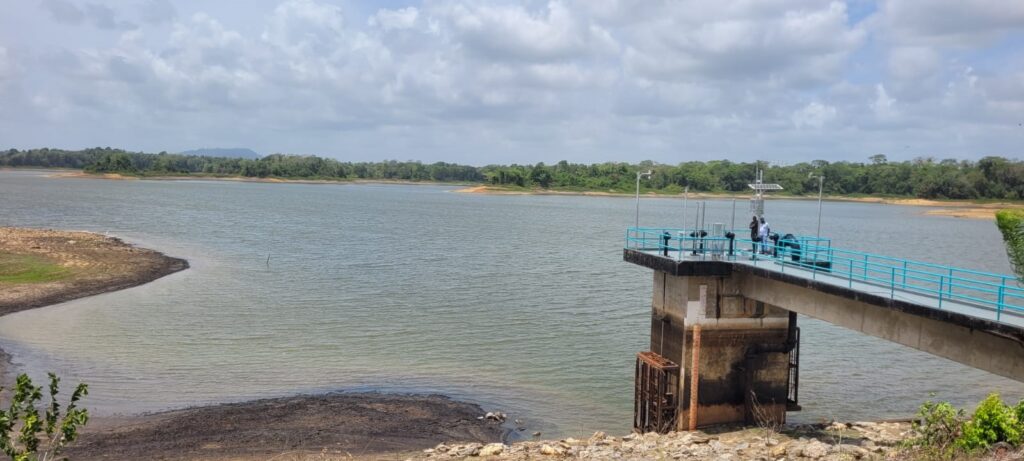WASA lost 36m gallons of water per day during dry spell

MINISTER of Public Utilities Marvin Gonzales said during the recent hot spell, WASA was losing 36 million gallons of water each day from its reservoirs owing to fallout from climate change, speaking in an interview on June 13 with television personality Wendell Etienne, posted on WASA's YouTube channel.
"Climate change is taking its toll upon us as a nation, as a region and as a world, and it requires urgent and decisive action," the minister said.
Gonzales said 60 per cent of WASA's water comes from surface water, namely rivers and streams, but this source is a very vulnerable to climate change.
In this vein, he said reservoirs at Navet, Hollis and Hillsboro had been "impacted significantly" by recent drought-like conditions linked to climate change.
"The heat and the evaporation that is happening right now, these storage reservoirs have been impacted significantly," he said, "And as a result of that, WASA is losing 36 million gallons of water per day."
Saying this had all been anticipated, he said WASA was acting to build its resilience.
"We have drilled over 11 ground water wells in strategic areas around the country – in Freeport, in Mayaro, Tobago, Arouca, just to name a few, and Valencia.
"As a result of that, WASA is producing four million gallons of water more and that four million gallons remained intact during this drought-like condition, whereas our rivers and reservoirs have been declining."
Gonzales said these wells have remained very resilient despite recent dry conditions.
He said WASA will drill 23 more wells to yield about eight million gallons, in areas such as Palo Seco, Granville, Mayaro, Freeport, Valencia and Tucker Valley.
Gonzales said the UN had said WASA produces adequate water for a 1.4 million population, respectively 240 million gallons daily in the wet season and 215 million gallons in the dry season. He said efforts were being made to help protect water sources by regulating squatting, hillside development and activities in forests.
Mulling WASA's costs relative to its customer rates, he said it was not a sexy nor comfortable conversation but he spoke openly and slept well at night.
He said Trinidad and Tobago has virtually the lowest water rates in the Western Hemisphere.
"To operate WASA it requires an injection of maybe $2 billion – (including) $1.2 billion or $1.3 billion from the State – to allow you to treat the water, pump the water, transmit the water and distribute it to citizens. Out of that $2.2 billion or $2.3 billion, WASA only contributes about $700 million.
"Because the rate that the utility agency collects for the water it produces is simply not enough."
Gonzales said the $700 million WASA collects from customers was not even enough to pay its desalination bill.
Due to this shortfall, WASA needed Government help to buy chemicals to treat water, pay salaries, refurbish pumps and plants, make capital investment, and expand/improve its service.
He said ideally a utility company should be in a financial position to meet its operational expenditure, with the Government only funding capital projects.
"WASA is far from that. With all the challenges now before the utility agencies brought about by climate change and other challenges, it is going to cost hundreds of millions of dollars more to position the company to respond to those challenges."
He said WASA's current operating cost of $2.3 billion could easily rise to $3 billion or more.
"We have to position ourselves to respond to those climate challenges. Where is the money going to come from? The Government is certainly not making the money from its revenue streams, so the money has to come from somewhere.
"The advice being given to the Government and also the RIC (Regulated Industries Commission) is, 'Listen, you all can't be serious.' This is what they tell us. 'You all can't be serious. You are operating under 1993 rates (but) things have gone up exponentially from 1993 to now."
He cited the expansion of WASA's network to serve an expanded population, plus more costly materials.
"So we have to get serious. So where is the money going to come from?"
Gonzales said WASA must get this sum from its customers, so as to be able to fund its operations to meet customer demands.
He reiterated that WASA had not had a rate review since 1993, while the Government no longer had funds it possessed ten-15 years ago.
"I will not apologise for speaking the truth. The truth is that while you rightly make demands on the utility agency (WASA), Trinidad and Tobago has the lowest rate for water and those rates cannot sustain the industry.
"It cannot sustain your water sector and your water sector will never be stabilised with those rates."
Gonzales saw a future WASA based on digital technology, having a "smart" network plus re-tooled/re-skilled staff, while "offering a lot of opportunities."

Comments
"WASA lost 36m gallons of water per day during dry spell"